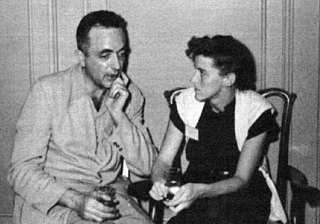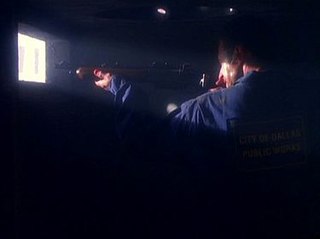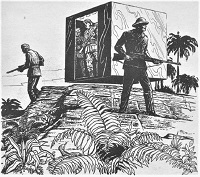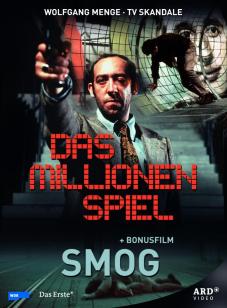Related Research Articles

Katherine Anne MacLean was an American science fiction author best known for her short fiction of the 1950s which examined the impact of technological advances on individuals and society.
Orphans of the Sky is a science fiction novel by American writer Robert A. Heinlein, consisting of two parts: "Universe" and its sequel, "Common Sense". The two novellas were first published together in book form in 1963. "Universe" was also published separately in 1951 as a 10¢ Dell paperback. The work presents one of the earliest fictional depictions of a generation ship.

Robert Sheckley was an American writer. First published in the science-fiction magazines of the 1950s, his many quick-witted stories and novels were famously unpredictable, absurdist, and broadly comical.

Kraven the Hunter is a fictional character appearing in American comic books published by Marvel Comics. Debuting in The Amazing Spider-Man #15 as an adversary to the superhero Spider-Man, he has since endured as one of the web-slinger's most formidable foes, and is part of the collective of adversaries that make up Spider-Man's rogues' gallery. Kraven has also come into conflict with other heroes, such as Black Panther and Tigra. He is the half-brother of the Chameleon and one of the founding members of the Sinister Six.

X Minus One is an American half-hour science fiction radio drama series that was broadcast from April 24, 1955, to January 9, 1958, in various timeslots on NBC. Known for high production values in adapting stories from the leading American authors of the era, X Minus One has been described as one of the finest offerings of American radio drama and one of the best science fiction series in any medium.

"The Most Dangerous Game", also published as "The Hounds of Zaroff", is a short story by Richard Connell, first published in Collier's on January 19, 1924, with illustrations by Wilmot Emerton Heitland. The story features a big-game hunter from New York City who falls from a yacht and swims to what seems to be an abandoned and isolated island in the Caribbean, where he is hunted by a Russian aristocrat. The story is inspired by the big-game hunting safaris in Africa and South America that were particularly fashionable among wealthy Americans in the 1920s.

Arcade is a supervillain appearing in American comic books published by Marvel Comics. He first appeared in 1978's Marvel Team-Up #65, the creation of writer Chris Claremont and writer/artist John Byrne. The character is a combination of an evil genius and a hitman who carries out his assassinations via various elaborate traps, often referred to as Murderworld.

Untouched by Human Hands is a collection of science fiction short stories by American writer Robert Sheckley. It was first published in 1954 simultaneously by Ballantine Books, both in hardback and paperback.

Samantha Ann Mulder is a fictional character in the television series The X-Files. She is the younger sister of FBI Special Agent Fox Mulder and the daughter of Teena and Bill Mulder. As a child, Samantha was abducted, ostensibly by aliens, and was never returned. It is this experience that drives her older brother Fox Mulder to join the FBI, and later take the reins of the X-Files section.

Surviving the Game is a 1994 American action-adventure film directed by Ernest R. Dickerson. It is loosely based on the 1924 short story "The Most Dangerous Game" by Richard Connell. The film stars Ice-T, Rutger Hauer, Charles S. Dutton, John C. McGinley, William McNamara, Gary Busey, and F. Murray Abraham.

Robert Christian Boes Hansen, popularly known as the Butcher Baker, was an American serial killer active in Anchorage, Alaska, between 1972 and 1983. Hansen abducted, raped and murdered at least seventeen women, many of whom he may have attacked in the wilderness with a Ruger Mini-14 and hunting knives. Hansen was captured in 1983 and sentenced to 461 years' imprisonment without the possibility of parole. He died in 2014 of natural causes at age 75.
The Federal Bureau of Investigation (FBI) has been a staple of American popular culture since its christening in 1935. That year also marked the beginning of the popular "G-Man" phenomenon that helped establish the Bureau's image, beginning with the aptly titled James Cagney movie, G Men. Although the detective novel and other police-related entertainment had long enthralled audiences, the FBI itself can take some of the credit for its media prominence. J. Edgar Hoover, the Bureau's "patriarch", took an active interest to ensure that it was not only well represented in the media, but also that the FBI was depicted in a heroic, positive light and that the message, "crime doesn't pay", was blatantly conveyed to audiences. The context, naturally, has changed profoundly since the 1930s "war on crime", and especially so since Hoover's death in 1972.

Cabela's Dangerous Hunts 2 is a 2005 hunting video game published Activision for PlayStation 2, Xbox, GameCube, and Microsoft Windows. It is a sequel to the 2003 game Cabela's Dangerous Hunts.

The 10th Victim is a 1965 science fiction film directed and co-written by Elio Petri, starring Marcello Mastroianni, Ursula Andress, Elsa Martinelli, and Salvo Randone. An international co-production between Italy and France, it is based on Robert Sheckley's 1953 short story "Seventh Victim".

The Most Dangerous Game is a 1932 American pre-Code horror film, directed by Ernest B. Schoedsack and Irving Pichel, starring Joel McCrea, Fay Wray and Leslie Banks.

"Musings of a Cigarette Smoking Man" is the seventh episode of the fourth season of the science fiction television series The X-Files. It premiered on the Fox network in the United States on November 17, 1996. It was written by Glen Morgan, directed by James Wong, and featured the first guest appearance by Chris Owens, appearing as a younger Smoking Man. "Musings of a Cigarette Smoking Man" earned a Nielsen household rating of 10.7, being watched by 17.09 million people in its initial broadcast. The episode received mostly positive reviews from television critics.

"A Gun for Dinosaur" is a classic time travel science fiction story by American writer L. Sprague de Camp as part of his Rivers of Time series. It tells the story of four men who travel into the past to hunt dinosaurs.
"Brand X" is the eighteenth episode of the seventh season of the science fiction television series The X-Files. It premiered on the Fox network in the United States on April 16, 2000. It was written by Steven Maeda and Greg Walker and directed by Kim Manners. The episode is a "Monster-of-the-Week" story, unconnected to the series' wider mythology. "Brand X" earned a Nielsen household rating of 6.8, being watched by 10.81 million people in its initial broadcast. The episode received mixed reviews from critics.

Das Millionenspiel is a 1970 German action/sci-fi television film, directed by Tom Toelle and starring Jörg Pleva, Suzanne Roquette and Dieter Thomas Heck. It was aired by ARD (broadcaster) on 18 October 1970. Wolfgang Menge wrote the screenplay, adapting the short story "The Prize of Peril" by the American writer Robert Sheckley. Wolfgang Menge and Tom Toelle received the 1971 Prix Italia for best television movie.

"The Most Dangerous Game" is a highly influential 1924 short story by Richard Connell. It tells the story of big-game hunter Sanger Rainsford becoming the hunted when trapped on a jungle island owned by General Zaroff, a Russian aristocrat who has turned to hunting man after growing bored of hunting animals. This story has been adapted into many works across many forms of media, including film, radio, television, and others.
References
- ↑ Slifkin, Irv (2004). VideoHound's Groovy Movies. Visible Ink Press. p. 192. ISBN 9781578591558.
- ↑ Westfahl, Gary (2005). The Greenwood Encyclopedia of Science Fiction and Fantasy. Greenwood Publishing Group. p. 680. ISBN 9780313329524.
- ↑ Greenwalt, Julie (19 January 1981). "Contrary to Belief, the Most Dangerous Game at Michigan Is Not Against Ohio State". People.
- ↑ Sheckley, Robert (2013). The Robert Sheckley megapack 15 classic science fiction stories. Wildside Press. p. 11 (in the Introduction). ISBN 978-1434446176.
- ↑ "X Minus 1". archive.org.
- ↑ Dixon, Wheeler (March 2013). "La decima vittima".
- ↑ Sheckley, Robert (1965). The 10th Victim. Ballantine Books.
- ↑ Sheckley, Robert (1987). Hunter Prime. Signet. ASIN 0451148649.
- ↑ Sheckley, Robert (1988). Hunter/Victim. Signet. ISBN 0451151429.